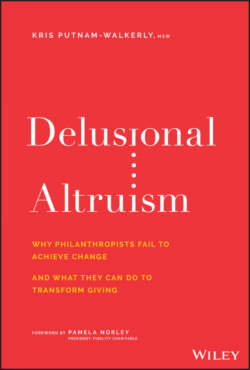Читать книгу Delusional Altruism - Kris Putnam-Walkerly - Страница 12
Not Trusting Yourself to Make a Decision
ОглавлениеToo often, funders don't trust themselves to make decisions. Instead, without realizing it, they shroud themselves in a blanket of “more information.” Here's how it works: You know (or are pretty darn sure you know) the answer. Then, you waste lots of time and money reassuring yourself you're right.
Here's an example: The leader of a corporate foundation wanted to hire a consultant. Two consultants were recommended highly. Still, she wasn't sure whom to choose, so she cast a wider net. She spent months developing a request for proposals (RFP) to find a consultant and another few weeks disseminating it widely. Next, she spent two months sifting through the dozens of proposals she'd received, scheduling and conducting interviews with finalists, selecting one consultant, and negotiating the contract. Six months later, she is ready to make the hire. Unfortunately, she's now lost half a year of her time, wasted countless hours of dozens of consultants' time, her project is delayed, she's behind in her other work, and the people her company is ultimately trying to help have been forced to wait—again.
What's even worse? After all that time and money she spent to find the consultant, she probably didn't find the best one. Why? Top talent in high demand wouldn't waste that much time applying!
Why do philanthropists do this to themselves? Their scarcity mind-set holds them back. They don't trust themselves to make decisions.
Look, sometimes the people involved genuinely don't know something, and they need to take time to learn. I get it. But in this example, the leader was smart. Think of how much better off everyone would have been had she met with each of the two recommended consultants, plus a couple more she could have easily found by asking trusted colleagues, and simply made a decision.
